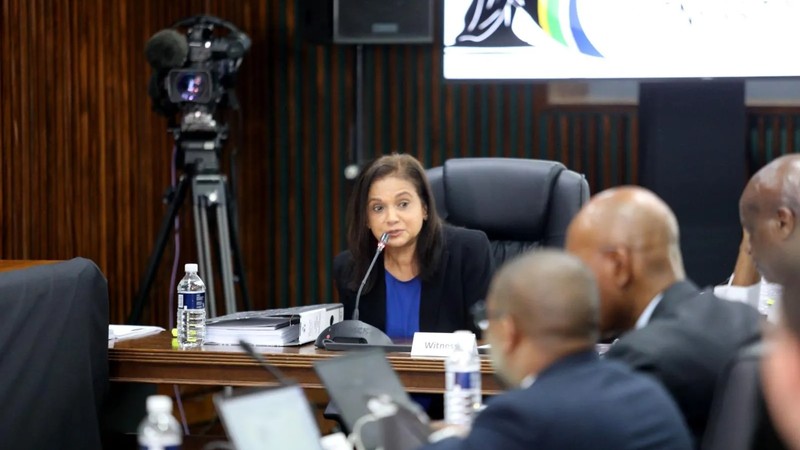
National Director of Public Prosecutions Shamila Batohi has told the Nkabinde Inquiry that Gauteng Director of Public Prosecutions (DPP) Andrew Chauke’s handling of the Richard Mdluli matter “was not consistent with the NPA’s policies and prescripts” and that his key decisions “failed to meet the standard expected of a senior prosecutor.”
Batohi was testifying before the inquiry on Thursday.
Evidence leader Advocate David Mhlamoynane SC led her through years of correspondence and court findings that have taken centre stage in examining whether Chauke improperly withdrew murder and attempted-murder charges against the former Crime Intelligence head.
Batohi said she wrote to Chauke on May 13 2021, requesting that he explain several decisions he made as DPP, including in the Booysen and Mdluli matters.
She told the inquiry that in her letter, she informed him that “a number of issues and decisions made by you have come to my attention and require additional information and clarification,” adding that she wished to “make an informed decision on how to proceed.”
Chauke’s response was then read into the record. In that response, Chauke insisted that the Supreme Court of Appeal (SCA) had found his decision to withdraw the charges “not irrational” and had indicated that any review should be undertaken by the National Director of Public Prosecutions.
He told Batohi that, following this, a reconsideration memorandum was prepared and submitted to then NDPP Mxolisi Nxasana, who “came to the same decision that I earlier made.”
He also wrote that “anyone who criticises me and imputes the decision under discussion to me only is both misplaced and wrong,” arguing that any criticism “should also include the then NDPP, Mr Nxasana.”
Chauke added that criticism levelled against him was “unfounded” and carried out “for nefarious reasons or in the service of an unknown agenda.”
Batohi disagreed, referring the inquiry to the opinion of Advocate Joe Nalane SC. She explained that Nalane had emphasised that “the critical time period” for assessing the rationality of the decision was February 2012, when Chauke personally withdrew the murder charges.
She said Nalane argued that the question was whether Chauke, “at that point in time, acted within the prescripts of the law, policies and directives applicable to him as a prosecutor, and in particular as the DPP.”
Batohi told the panel, “It is clear that the later reconsideration by Mr Nxasana cannot serve as retroactive justification for Advocate Chauke’s original decision.”
After conferring with the evidence team, she confirmed that the relevant period was confined to February 2 2012 and the immediate weeks after, when he referred the matter to an inquest, more than two years before the SCA judgment.
The inquiry heard that Chauke had told Batohi in his written response that he believed an inquest “might cause inculpatory evidence to surface.”
But Batohi testified that Chauke never explained what gaps existed in the case or what evidence he thought was missing.
She said that prior to the withdrawal, the prosecution team, Judge Murphy on review, and later Brandt Judgement at the SCA, all concluded that the evidence was already strong enough to prosecute.
Batohi said, “Referring a matter like this to an inquest, where there is already sufficient evidence, poses a serious risk of weakening the case, not strengthening it.”
She explained that traumatised witnesses, some of whom had endured years of intimidation, would be exposed to cross-examination, giving the defence advance insight into their testimony.
She emphasised that by 2012, “the matter was already 13 years old,” and subjecting witnesses to yet another process ”would only serve to jeopardise the State’s prospects.”
She said that even after the inquest magistrate made findings supportive of prosecution, Chauke “still did not reinstate the murder and attempted-murder charges.”
Instead, Chauke authorised prosecution only on lesser charges such as intimidation, kidnapping, assault and assault with intent to cause grievous bodily harm.
Those charges eventually led to Mdluli’s conviction in July 2019 before Judge Mokgoatlheng. Batohi noted that Judge Mokgoatlheng rejected Mdluli’s argument that he was the victim of a wide-ranging conspiracy, finding that the alleged conspiracy had been “fabricated, concocted and was not shown to exist.”
She said this showed that the representations Chauke had relied upon in 2012 were “weak, unsubstantiated and later shown to be totally false.”
Summarising her position, Batohi told the inquiry: “In the circumstances, Advocate Chauke ought to have reinstated the murder charge.”
She said that his decisions in the matter “were not in line with the NPA’s policies, prescripts or his responsibilities as DPP.”
Politics
